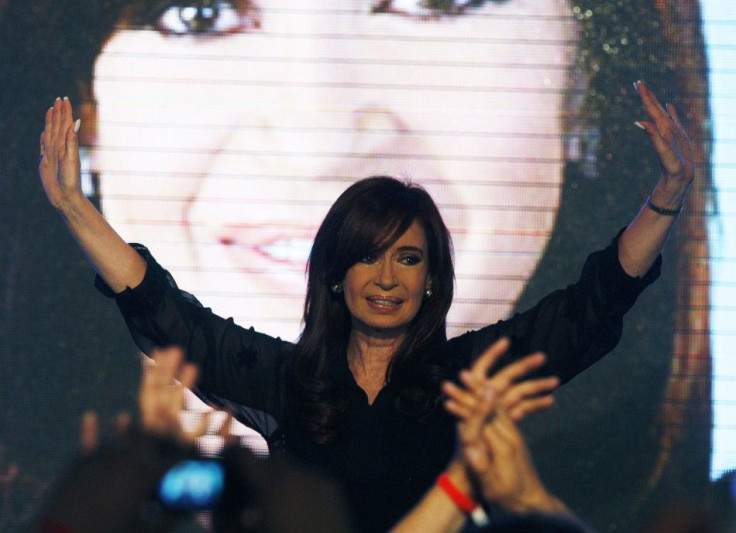Argentina's Fernandez Hand Strengthened by Primary

Center-left Argentine President Cristina Fernandez looks set to win a second term in October and deepen her interventionist policies after thrashing rivals in a primary election, results showed on Monday.
With almost all of the votes counted, Fernandez had just over 50 percent support -- 38 percentage points ahead of her closest contenders, centrist congressman Ricardo Alfonsin and former President Eduardo Duhalde.
Sunday's primary vote was effectively a nationwide opinion poll because the parties had already chosen their candidates and voters could cast ballots for any of them.
Fernandez has rankled Wall Street by imposing price controls, nationalizing private pension funds and publishing inflation data far below private estimates.
But Argentine voters put her on track for a first-round triumph on October 23, when she will need just over 45 percent support to win outright.
Markets barely reacted to the primary landslide since her expected re-election is already priced in to Argentine assets.
Although Latin America's third-largest economy is booming, Fernandez faces major challenges. She will have to tame high inflation without hurting growth, cut spending, and find a way to repay debt without draining central bank reserves.
Asked on Monday how she plans to cover debt payments next year, Fernandez alluded to doubts over U.S. and European financial woes. "Talking about next year in today's world is like talking about something two centuries away."
She said her government has adopted a mix of orthodox and unorthodox measures to overcome obstacles in the past, telling reporters many of these steps "were not understood."
"When we have a clearer view of the global scenario ... we will take whatever measures are needed, as we've always done."
Fernandez also urged Congress to pass her bill to limit foreign land ownership, pushing ahead with a policy initiative aimed at strengthening Argentine control over its farmland and other natural resources.
OPPOSITION WEAKENED
Argentina's political opposition took control of Congress in 2009 when Fernandez of the ruling Peronist party was still reeling from a farmers' tax revolt from a year earlier and the global financial crisis.
But sharp divisions between opposition leaders have rendered them incapable of blocking government initiatives.
Sunday's primary left the opposition weaker and more fragmented than ever, political analysts said.
Alfonsin and dissident Peronist Duhalde both won 12.2 percent of votes while Hermes Binner, the socialist governor of Santa Fe province, fetched 10.3 percent.
The law prohibits them from forming an alliance.
"With the three leading candidates in the opposition practically tied, the probability of someone stepping down to consolidate the vote against the government seems unlikely," Felipe Hernandez, an RBS analyst, wrote in a research note.
Government curbs on corn and wheat exports have riled farmers and exporters in the major grains-producing nation. But Fernandez, 58, won strong support in urban and rural areas -- including farming centers.
Many Argentines credit Fernandez and her late husband and predecessor, Nestor Kirchner, with reviving the economy after a 2001/02 financial crisis, when Argentina declared a record sovereign debt default that made it a market pariah.
Their governments stoked high growth at the cost of fanning inflation, estimated privately at about 25 percent a year.
Economists say surging prices along with costly energy subsidies and a shrinking trade surplus will spell trouble.
Fernandez's strong backing "reduces the probability of the government proactively adjusting economic policy, despite evidence of imbalances and market concerns about sustainability in the medium and long term," Hernandez said.
MARKETS UNRUFFLED
Financial markets had priced in a second four-year term for Fernandez, but some investors hoped a strong opposition contender would emerge and spark a bond and stock rally.
This did not materialize. Argentina's benchmark MerVal stock index closed up 0.76 percent on Monday, buoyed by gains abroad, while the peso currency ended mixed on the informal and interbank markets.
Argentine bonds traded locally over-the-counter ended flat but GDP warrants -- which provide bigger payouts to holders the more the economy grows -- rose by as much as 3.8 percent.
"Cristina's electoral results had a clear, solid effect on GDP warrants. These continue to be the market's superstar, both in pesos and dollars," said Ruben Pascuali, an analyst at Mayoral Bursatil brokerage. "Many investors think that if Cristina wins, high growth rates will continue because the government will keep bolstering domestic consumption."
In October, Fernandez needs to earn 45 percent of the vote to win re-election outright. She could also avoid a run-off with 40 percent plus a 10-point lead over the runner-up.
Voting in Sunday's primary was obligatory and the turnout was higher than expected at nearly 78 percent.
© Copyright Thomson Reuters 2024. All rights reserved.





















